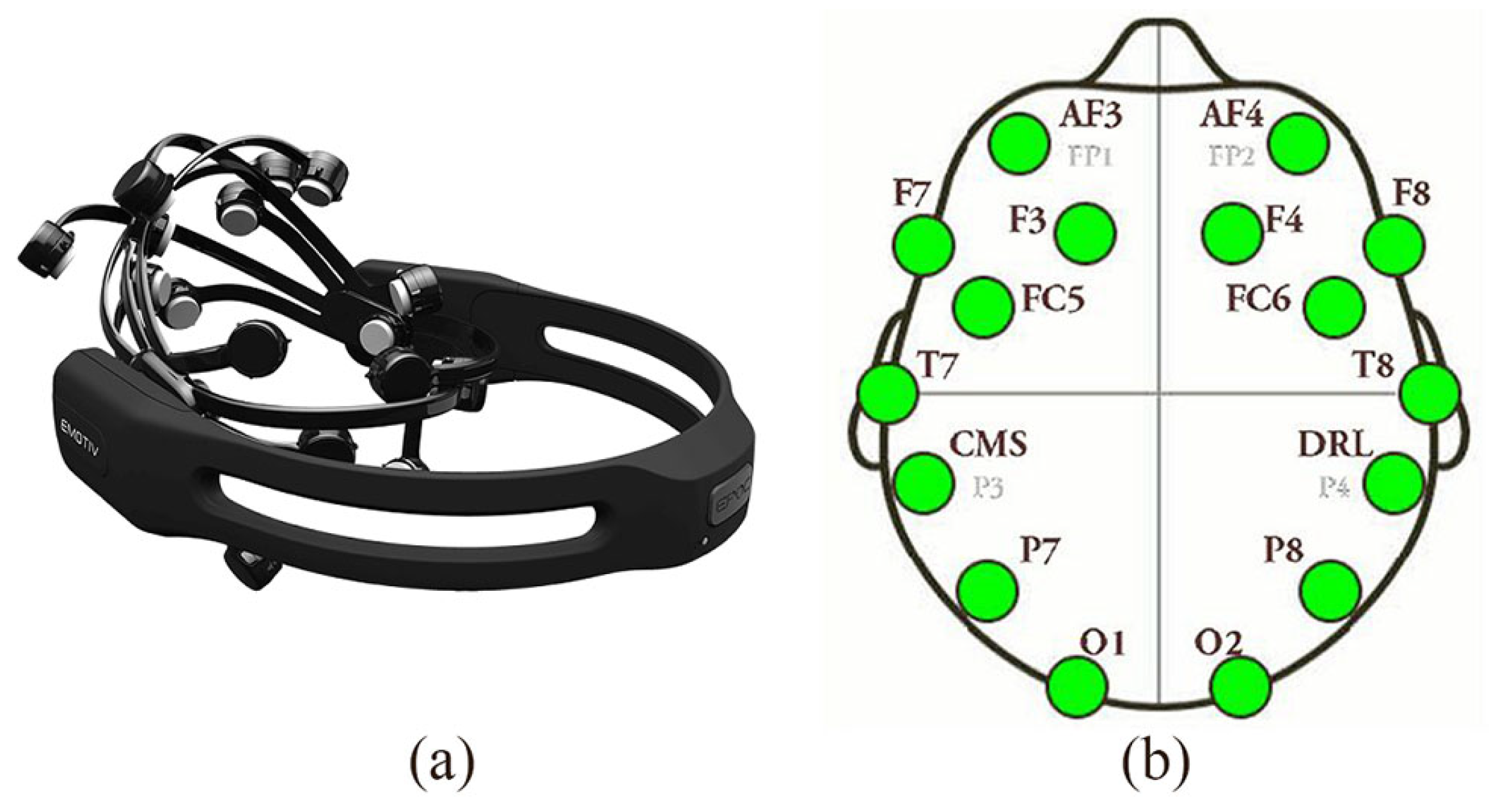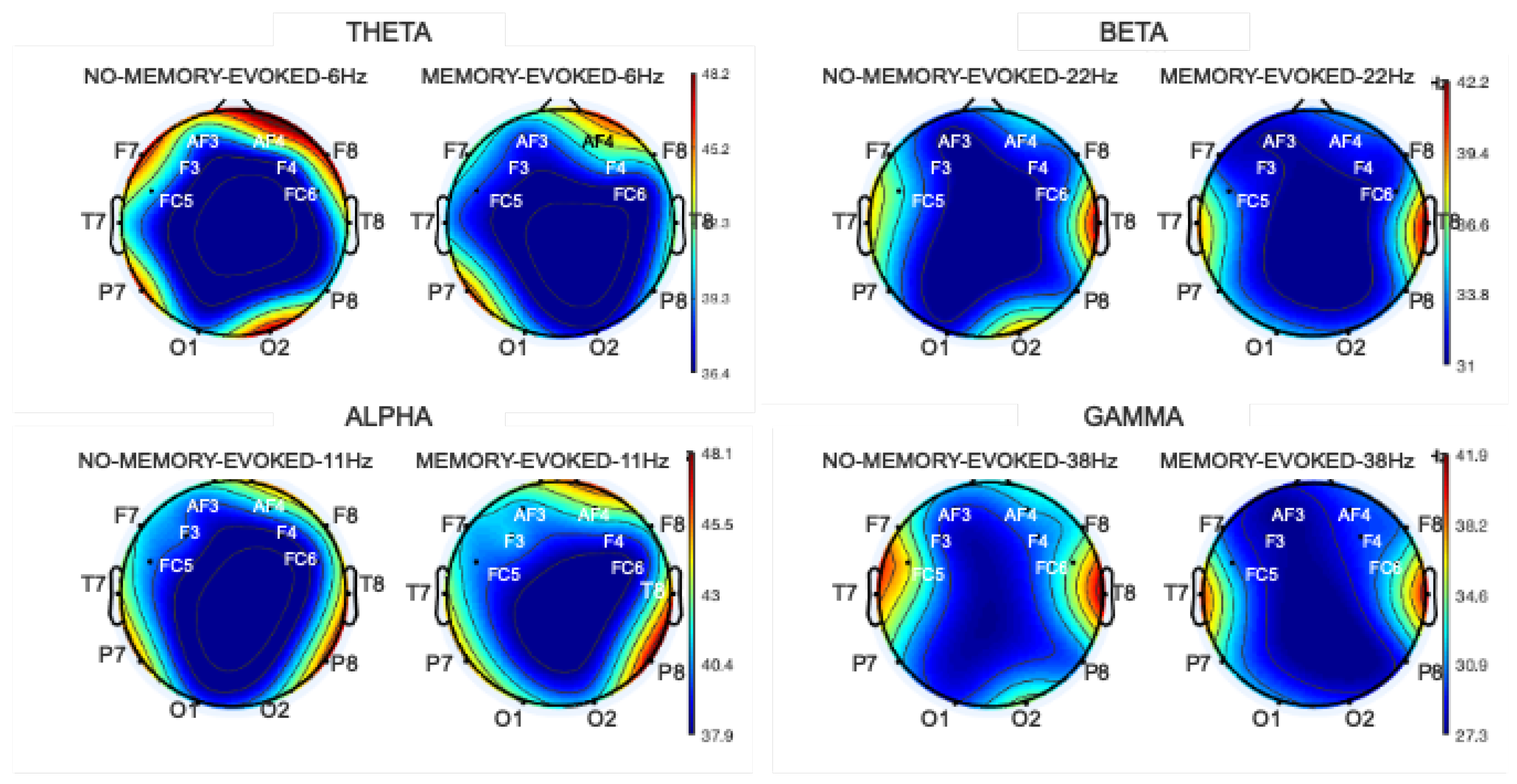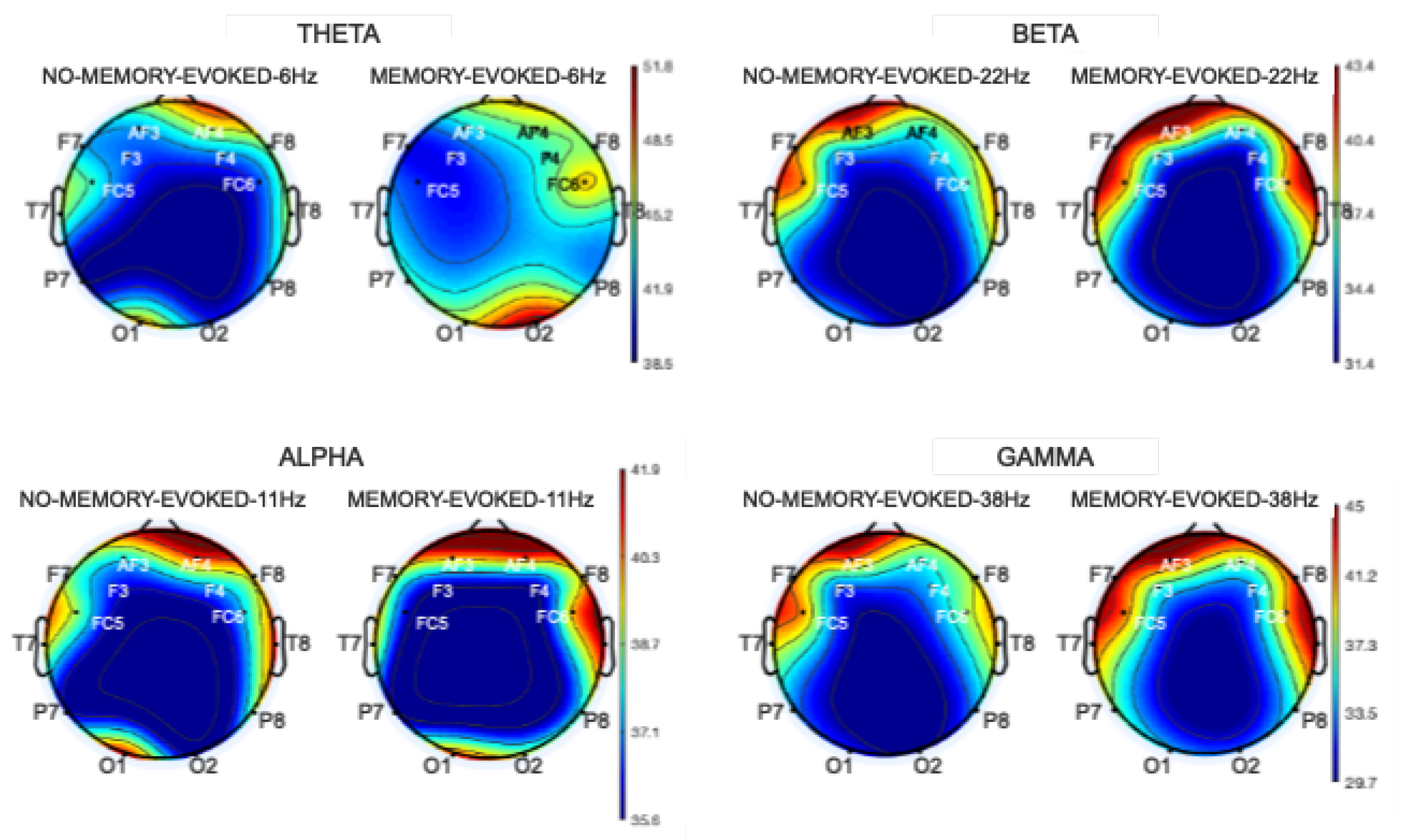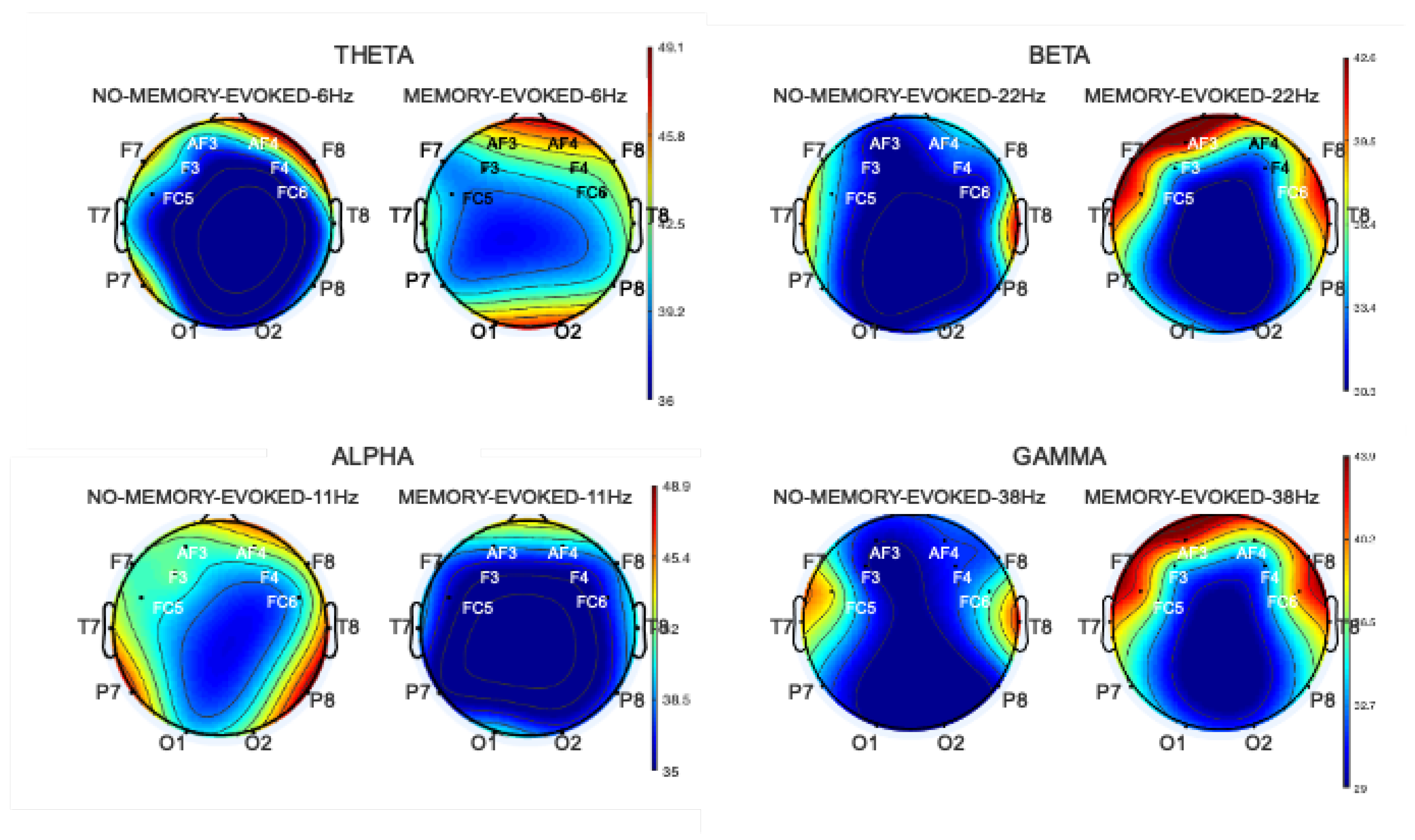Memory Retrieval in Ageing Adults through Traditional Music Genres—An Experiment Based on Electroencephalography Signals †
Abstract
:1. Introduction
2. Materials
2.1. E-Prime and Music Tracks
2.2. Emotiv EPOC+ Headset and EmoSys Software Suite
2.3. PANAS Questionnaire
3. Methods
3.1. Participants
3.2. Experiment Design
4. Feature Extraction and Metrics
4.1. Preprocessing of EEG signals
4.2. Feature Extraction
- Delta waves () (0–4 Hz) are present in children under 1 year of age and in adults in deep sleep. A large amount of delta activity in awake adults is abnormal and related to neurological diseases. Because of its low frequency, it is easy to confuse delta waves with artefacts caused by large muscles in the neck or jaw. It is important to remark that in the emotional field the delta band in not relevant [24,25].
- Theta waves () (4–7 Hz) are in the temporal-parietal region of the cortex. They are produced by emotional stress, especially frustration or disappointment. They have also been associated with access to unconscious material, creative inspiration and deep meditation.
- Alpha waves () (8–15 Hz) are present during states of wakefulness, on rear regions of the head, generally of great amplitude on the occipital zones. The amplitude of alpha waves increases when the eyes are closed or in states of relaxation and little mental activity, and they attenuate or decrease when the eyes are opened, during attention, especially visual, and mental effort.
- Beta waves () (15–30 Hz) are small, fast waves associated with concentration and intense mental activities and are well defined in the central and frontal cortex.
- Gamma waves () (30–45 Hz) are the fastest waves in the brain. They are associated with increased mental activity (e.g., during problem solving) and may include flashes of brilliance, sudden bursts of perception/intuition and moments of extreme attention and concentration.
4.3. Statistical Analysis
- H0: There are no statistically significant differences in brain activation, i.e.: “MEMORY-EVOKED” = “NO-MEMORY-EVOKED”
- H1: There are statistically significant differences in brain activation, i.e.:“MEMORY-EVOKED” ≠ “NO-MEMORY-EVOKED”
5. Results
5.1. Intra-Subject Studies
5.1.1. Analysis Using Complete Pieces of Music Each Lasting 60 s
5.1.2. Analysis Using Segmented Pieces of Music Lasting 15 s
5.2. Inter-Subjects Study
6. Discussion and Conclusions
Author Contributions
Acknowledgments
Conflicts of Interest
Abbreviations
| BCI | brain-computer interface |
| EEG | electroencephalogram |
| PANAS | positive and negative affect scales |
| SAM | self-assessment manikin |
References
- Fernández-Sotos, A.; Fernández-Caballero, A.; Latorre, J.M. Elicitation of emotions through music: The influence of note value. In Artificial Computation in Biology and Medicine; Springer: Cham, Switzerland, 2015; pp. 488–497. [Google Scholar]
- Fernández-Caballero, A.; Martínez-Rodrigo, A.; Pastor, J.M.; Castillo, J.C.; Lozano-Monasor, E.; López, M.T.; Zangróniz, R.; Latorre, J.M.; Fernández-Sotos, A. Smart environment architecture for emotion recognition and regulation. J. Biomed. Inform. 2016, 64, 55–73. [Google Scholar] [CrossRef] [PubMed]
- Russell, J.A. A circumplex model of affect. J. Personal. Soc. Psychol. 1980, 39, 1161. [Google Scholar] [CrossRef]
- Brewer, W.F. What Is Autobiographical Memory? Cambridge University Press: Cambridge, UK, 1986. [Google Scholar]
- Conway, M.A. Sensory–perceptual episodic memory and its context: Autobiographical memory. Philos. Trans. R. Soc. Lond. Ser. Biol. Sci. 2001, 356, 1375–1384. [Google Scholar] [CrossRef] [PubMed]
- Bradley, M.M. Emotional memory: A dimensional analysis. In Emotions; Psychology Press: London, UK, 2014; pp. 111–148. [Google Scholar]
- Martínez-Rodrigo, A.; Zangróniz, R.; Pastor, J.M.; Fernández-Caballero, A. Arousal level classification in the ageing adult by measuring electrodermal skin conductivity. In Ambient Intelligence for Health; Springer: Cham, Switzerland, 2015; pp. 213–223. [Google Scholar]
- Sokolova, M.V.; Fernández-Caballero, A. A review on the role of color and light in affective computing. Appl. Sci. 2015, 5, 275–293. [Google Scholar] [CrossRef]
- Terrett, G.; Horner, K.; White, R.; Henry, J.D.; Kliegel, M.; Labuschagne, I.; Rendell, P.G. The relationship between episodic future thinking and prospective memory in middle childhood: Mechanisms depend on task type. J. Exp. Child Psychol. 2019, 178, 198–213. [Google Scholar] [CrossRef]
- Fernández-Sotos, A.; Martínez-Rodrigo, A.; Moncho-Bogani, J.; Latorre, J.M.; Fernández-Caballero, A. Neural correlates of phrase quadrature perception in harmonic rhythm: An EEG study using a brain–computer interface. Int. J. Neural Syst. 2017, 28, 1750054. [Google Scholar] [CrossRef]
- Martínez-Rodrigo, A.; Fernández-Sotos, A.; Latorre, J.M.; Moncho-Bogani, J.; Fernández-Caballero, A. Neural correlates of phrase rhythm: An EEG study of bipartite vs. rondo sonata form. Front. Neuroinform. 2017, 11, 29. [Google Scholar] [CrossRef]
- Fernández-Sotos, A.; Fernández-Caballero, A.; Latorre, J.M. Influence of tempo and rhythmic unit in musical emotion regulation. Front. Comput. Neurosci. 2016, 10, 80. [Google Scholar] [CrossRef]
- Williams, J.M.G.; Barnhofer, T.; Crane, C.; Herman, D.; Raes, F.; Watkins, E.; Dalgleish, T. Autobiographical memory specificity and emotional disorder. Psychol. Bull. 2007, 133, 122. [Google Scholar] [CrossRef]
- Cohen, G. The effects of aging on autobiographical memory. In Autobiographical Memory; Psychology Press: London, UK, 2014; pp. 105–124. [Google Scholar]
- Sánchez-Reolid, R.; García, A.S.; Vicente-Querol, M.A.; Fernández-Aguilar, L.; López, M.T.; Fernández-Caballero, A.; González, P. Artificial neural networks to assess emotional states from brain-computer interface. Electronics 2018, 7, 384. [Google Scholar] [CrossRef]
- Conway, M.A.; Pleydell-Pearce, C.W.; Whitecross, S.; Sharpe, H. Brain imaging autobiographical memory. In Psychology of Learning and Motivation; Elsevier: Amsterdam, The Netherlands, 2002; Volume 41, pp. 229–263. [Google Scholar]
- Schneider, W.; Eschman, A.; Zuccolotto, A. E-Prime: User’s Guide; Psychology Software Incorporated: Sharpsburg, PA, USA, 2002. [Google Scholar]
- Lievesley, R.; Wozencroft, M.; Ewins, D. The Emotiv EPOC neuroheadset: An inexpensive method of controlling assistive technologies using facial expressions and thoughts? J. Assist. Technol. 2011, 5, 67–82. [Google Scholar] [CrossRef]
- Emotiv. Emotiv SDK User Manual. Available online: https://www.emotiv.com/epoc/ (accessed on 20 November 2019).
- Watson, D.; Clark, L.A.; Tellegen, A. Development and validation of brief measures of positive and negative affect: The PANAS scales. J. Personal. Soc. Psychol. 1988, 54, 1063. [Google Scholar] [CrossRef] [PubMed]
- Gaudreau, P.; Sanchez, X.; Blondin, J.P. Positive and negative affective states in a performance-related setting: Testing the factorial structure of the PANAS across two samples of French-Canadian participants. Eur. J. Psychol. Assess. 2006, 22, 240–249. [Google Scholar] [CrossRef]
- Sanei, S. Adaptive Processing of Brain Signals; John Wiley & Sons: Hoboken, NJ, USA, 2013. [Google Scholar]
- Koelstra, S.; Muhl, C.; Soleymani, M.; Lee, J.S.; Yazdani, A.; Ebrahimi, T.; Pun, T.; Nijholt, A.; Patras, I. DEAP: A database for emotion analysis using physiological signals. IEEE Trans. Affect. Comput. 2012, 3, 18–31. [Google Scholar] [CrossRef]
- Tatum, W.O., IV. Handbook of EEG Interpretation; Demos Medical Publishing: New York, NY, USA, 2014. [Google Scholar]
- Klimesch, W. EEG alpha and theta oscillations reflect cognitive and memory performance: A review and analysis. Brain Res. Rev. 1999, 29, 169–195. [Google Scholar] [CrossRef]
- Teplan, M. Fundamentals of EEG measurement. Meas. Sci. Rev. 2002, 2, 1–11. [Google Scholar]
- Martínez-Rodrigo, A.; García-Martínez, B.; Zunino, L.; Alcaraz, R.; Fernández-Caballero, A. Multi-lag analysis of symbolic entropies on EEG recordings for distress recognition. Front. Neuroinform. 2019, 13, 40. [Google Scholar] [CrossRef]
- Martínez-Rodrigo, A.; García-Martínez, B.; Alcaraz, R.; González, P.; Fernández-Caballero, A. Multiscale entropy analysis for recognition of visually elicited negative stress from EEG recordings. Int. J. Neural Syst. 2019, 29, 1850038. [Google Scholar] [CrossRef]
- García-Martínez, B.; Martinez-Rodrigo, A.; Alcaraz, R.; Fernández-Caballero, A. A review on nonlinear methods using electroencephalographic recordings for emotion recognition. IEEE Trans. Affect. Comput. 2019. [Google Scholar] [CrossRef]
- García-Martínez, B.; Martínez-Rodrigo, A.; Fernández-Caballero, A.; Moncho-Bogani, J.; Alcaraz, R. Nonlinear predictability analysis of brain dynamics for automatic recognition of negative stress. Neural Comput. Appl. 2018. [Google Scholar] [CrossRef]
- Bares, M.; Brunovsky, M.; Novak, T.; Kopecek, M.; Stopkova, P.; Sos, P.; Höschl, C. QEEG theta cordance in the prediction of treatment outcome to prefrontal repetitive transcranial magnetic stimulation or venlafaxine ER in patients with major depressive disorder. Clin. Eeg Neurosci. 2015, 46, 73–80. [Google Scholar] [CrossRef] [PubMed]
- Delorme, A.; Makeig, S. EEGLAB: An open source toolbox for analysis of single-trial EEG dynamics including independent component analysis. J. Neurosci. Methods 2004, 134, 9–21. [Google Scholar] [CrossRef] [PubMed]
- Ros, L.; Latorre, J.M.; Aguilar, M.J.; Ricarte, J.J.; Castillo, A.; Catena, A.; Fuentes, L.J. Differences in brain activation between the retrieval of specific and categoric autobiographical memories: An EEG study. Psicol. Int. J. Methodol. Exp. Psychol. 2017, 38, 347–363. [Google Scholar]
- Yousefzadeh, F.; Pirzad Jahromi, G.; Mokari Manshadi, E.; Hatef, B. The effect of prostration (Sajdah) on the prefrontal brain activity: A pilot study. Basic Clin. Neurosci. 2019, 10, 257–268. [Google Scholar]
- Gevins, A.; Zeitlin, G.; Doyle, J.; Yingling, C.; Schaffer, R.; Callaway, E.; Yeager, C. Electroencephalogram correlates of higher cortical functions. Science 1979, 203, 665–668. [Google Scholar] [CrossRef]
- Polich, J. On the relationship between EEG and P300: Individual differences, aging, and ultradian rhythms. Int. J. Psychophysiol. 1997, 26, 299–317. [Google Scholar] [CrossRef] [PubMed]
- Conway, M.A.; Pleydell-Pearce, C.W.; Whitecross, S.E.; Sharpe, H. Neurophysiological correlates of memory for experienced and imagined events. Neuropsychologia 2003, 41, 334–340. [Google Scholar] [CrossRef]
- Subramaniam, K.; Hinkley, L.B.; Mizuiri, D.; Kothare, H.; Cai, C.; Garrett, C.; Findlay, A.; Houde, J.F.; Nagarajan, S.S. Beta-band activity in medial prefrontal cortex predicts source memory encoding and retrieval accuracy. Sci. Rep. 2019, 9, 6814. [Google Scholar] [CrossRef]
- Steinvorth, S.; Wang, C.; Ulbert, I.; Schomer, D.; Halgren, E. Human entorhinal gamma and theta oscillations selective for remote autobiographical memory. Hippocampus 2010, 20, 166–173. [Google Scholar] [CrossRef]







| Musical Genre | Style |
|---|---|
| Rock/Jazz | Twist and swing |
| Flamenco | Fandango and petenera |
| Cuban Genre | Bolero and habanera |
| Spanish folklore | Pasodoble and jota murciana |
| Theta | ||||||||||||||
|---|---|---|---|---|---|---|---|---|---|---|---|---|---|---|
| Channel | AF3 | AF4 | F3 | F4 | F7 | F8 | FC5 | FC6 | O1 | O2 | P7 | P8 | T7 | T8 |
| 0.480 | 0.035 | 0.157 | 0.029 | 0.157 | 0.045 | 0.157 | 0.040 | 0.480 | 0.480 | 0.157 | 0.157 | 0.040 | 0.157 | |
| Alpha | ||||||||||||||
| Channel | AF3 | AF4 | F3 | F4 | F7 | F8 | FC5 | FC6 | O1 | O2 | P7 | P8 | T7 | T8 |
| 0.480 | 0.157 | 0.157 | 0.157 | 0.157 | 0.157 | 0.045 | 0.042 | 0.480 | 0.048 | 0.157 | 0.157 | 0.157 | 0.157 | |
| Beta | ||||||||||||||
| Channel | AF3 | AF4 | F3 | F4 | F7 | F8 | FC5 | FC6 | O1 | O2 | P7 | P8 | T7 | T8 |
| 0.480 | 0.157 | 0.157 | 0.157 | 0.157 | 0.157 | 0.157 | 0.480 | 0.480 | 0.480 | 0.367 | 0.657 | 0.450 | 0.255 | |
| Gamma | ||||||||||||||
| Channel | AF3 | AF4 | F3 | F4 | F7 | F8 | FC5 | FC6 | O1 | O2 | P7 | P8 | T7 | T8 |
| 0.480 | 0.157 | 0.157 | 0.157 | 0.157 | 0.157 | 0.157 | 0.480 | 0.480 | 0.480 | 0.157 | 0.157 | 0.157 | 0.157 | |
| Theta | ||||||||||||||
|---|---|---|---|---|---|---|---|---|---|---|---|---|---|---|
| Channel | AF3 | AF4 | F3 | F4 | F7 | F8 | FC5 | FC6 | O1 | O2 | P7 | P8 | T7 | T8 |
| 0.036 | 0.025 | 0.157 | 0.034 | 0.157 | 0.046 | 0.057 | 0.030 | 0.760 | 0.045 | 0.185 | 0.169 | 0.048 | 0.497 | |
| Alpha | ||||||||||||||
| Channel | AF3 | AF4 | F3 | F4 | F7 | F8 | FC5 | FC6 | O1 | O2 | P7 | P8 | T7 | T8 |
| 0.028 | 0.067 | 0.017 | 0.042 | 0.042 | 0.019 | 0.035 | 0.048 | 0.036 | 0.046 | 0.017 | 0.063 | 0.023 | 0.019 | |
| Beta | ||||||||||||||
| Channel | AF3 | AF4 | F3 | F4 | F7 | F8 | FC5 | FC6 | O1 | O2 | P7 | P8 | T7 | T8 |
| 0.018 | 0.017 | 0.013 | 0.042 | 0.542 | 0.032 | 0.023 | 0.041 | 0.369 | 62 | 0.012 | 0.023 | 0.423 | 0.216 | |
| Gamma | ||||||||||||||
| Channel | AF3 | AF4 | F3 | F4 | F7 | F8 | FC5 | FC6 | O1 | O2 | P7 | P8 | T7 | T8 |
| 0.048 | 0.052 | 0.015 | 0.015 | 0.117 | 0.132 | 0.143 | 0.450 | 0.420 | 0.560 | 0.657 | 0.427 | 0.132 | 0.127 | |
Publisher’s Note: MDPI stays neutral with regard to jurisdictional claims in published maps and institutional affiliations. |
© 2019 by the authors. Licensee MDPI, Basel, Switzerland. This article is an open access article distributed under the terms and conditions of the Creative Commons Attribution (CC BY) license (https://creativecommons.org/licenses/by/4.0/).
Share and Cite
Bartolomé-Tomás, A.; Sánchez-Reolid, R.; García-Martinez, B.; Fernández-Sotos, A.; Fernández-Caballero, A. Memory Retrieval in Ageing Adults through Traditional Music Genres—An Experiment Based on Electroencephalography Signals. Proceedings 2019, 31, 33. https://doi.org/10.3390/proceedings2019031033
Bartolomé-Tomás A, Sánchez-Reolid R, García-Martinez B, Fernández-Sotos A, Fernández-Caballero A. Memory Retrieval in Ageing Adults through Traditional Music Genres—An Experiment Based on Electroencephalography Signals. Proceedings. 2019; 31(1):33. https://doi.org/10.3390/proceedings2019031033
Chicago/Turabian StyleBartolomé-Tomás, Almudena, Roberto Sánchez-Reolid, Beatriz García-Martinez, Alicia Fernández-Sotos, and Antonio Fernández-Caballero. 2019. "Memory Retrieval in Ageing Adults through Traditional Music Genres—An Experiment Based on Electroencephalography Signals" Proceedings 31, no. 1: 33. https://doi.org/10.3390/proceedings2019031033
APA StyleBartolomé-Tomás, A., Sánchez-Reolid, R., García-Martinez, B., Fernández-Sotos, A., & Fernández-Caballero, A. (2019). Memory Retrieval in Ageing Adults through Traditional Music Genres—An Experiment Based on Electroencephalography Signals. Proceedings, 31(1), 33. https://doi.org/10.3390/proceedings2019031033







